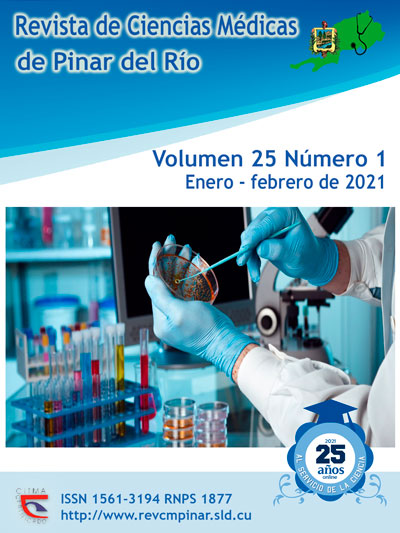Una experiencia de orientación desde el Telecentro de Pinar del Río
Palabras clave:
ORIENTACIÓN, ORIENTACIÓN PSICOLÓGICA, TELEVISIÓN, EMIGRACIÓN.Resumen
Introducción: La investigación responde a la necesidad de ampliar y diversificar la orientación psicológica que se ofrece a la población pinareña a través del medio televisivo, con énfasis en las familias que se encuentran inmersas en situaciones de emigración.
Objetivo: diseñar el programa televisivo Conversemos, como propuesta de orientación psicológica dirigida a familias en situaciones de emigración, para contribuir a su funcionamiento adecuado.
Métodos: se realizó un estudio transversal que combinó elementos descriptivos y explicativos, con la aplicación de los métodos histórico-lógico, modelación, sistémico estructural, entrevista, encuesta y análisis documental. Se desarrolló un diagnóstico en la televisión de Pinar del Río
Resultados: se corroboró que la motivación de los implicados hacia el tema de la familia en situaciones de emigración fue adecuada, no así la satisfacción con su tratamiento actual, la cual se manifestó baja. El conocimiento en los especialistas fue elevado, limitado en los directivos y la teleaudiencia. Se diseñó el programa televisivo Conversemos, para ofrecer a la teleaudiencia pinareña un espacio de orientación que desarrollara habilidades y recursos para afrontar exitosamente la problemática migratoria.
Conclusión: la orientación psicológica que se ofrecía en la televisión pinareña hacia la familia en situaciones de emigración, resultó insuficiente. Se evidenció elevada motivación hacia el tema por parte de la teleaudiencia y los especialistas, quienes poseen conocimiento adecuado sobre el tema, limitado por parte de la teleaudiencia y los directivos del telecentro, lo que determinó niveles bajos de satisfacción en todos los implicados.
Descargas
Citas
1. Calviño M. Orientación Psicológica. Esquema referencial de alternativa múltiple. [Internet]. La Habana: Científico Técnica, 2002 [Citado 20/07/2020]. Disponible en: https://www.ecured.cu/Orientaci%C3%B3n_Psicol%C3%B3gica:_Esquema_referencial_de_alternativa_m%C3%BAltiple_(Libro)
2. Molina M. Orientación psicológica como intervención de elección ante las demandas del sistema sanitario en la atención primaria de salud. Alternativas cubanas en Psicología [Internet]. 2018[Citado 20/07/2020]; 1(2). Disponible en: https://www.acupsi.org/articulo/33/orientacin-psicolgica-como-intervencin-de-eleccin-ante-las-demandas-del-sistema-sanitario-en-la-atencin-primaria-de-salud.html
3. Miranda D, Pacheco K, Falcón H. Funcionamiento familiar a partir de la emigración de una de las figuras paternas. Estudio de caso. Trabajo de Diploma en opción al Título de Licenciatura en Psicología, Cuba; 2009.
4. Martín C. Familia, migración y salud mental [Internet]. La Habana (CEMI); 2006 [Citado 02/11/2019]. Disponible en: http://www.sld.cu/galerias/pdf/sitios/desastres/salud_mental_y_migraciones_dra__consuelo_martin.pdf
5. Aja Díaz A. La emigración cubana hacia Estados Unidos a la luz de su política inmigratoria. CEMI, Centro de Estudios de Migraciones Internacionales [Internet]. La Habana; 2002 [Citado 02/11/2019]. Disponible en: http://biblioteca.clacso.edu.ar/Cuba/cemi-uh/20120821035541/laemig.pdf
6. Aguiar E. Cuando la emigración irrumpe en los vínculos de familia y pareja. Revista Actualidad Psicológica [Internet]. 2004 [Citado 02/11/2019]. Disponible en: https://www.apdh.org.ar/sites/default/files/u6/Cuando%20la%20emigracion%20irrumpe.pdf
7. Arés Muzio P. Grandes cambios para la familia. I parte. Revista Sexología y Sociedad [Internet]. 2014 [citado 09/11/2019]; 6(15): [aprox. 0p.]. Disponible en: http://revsexologiaysociedad.sld.cu/index.php/sexologiaysociedad/article/view/188
8. Arés P. Psicología de la familia: Una aproximación a su estudio. La Habana: Editorial Félix Varela; 2002. Disponible en: https://books.google.com.cu/books?id=KyBXMwEACAAJ
9. González V. Para entender la televisión. Libro en soporte digital. Repositorio de materiales del Centro de Estudios de Ciencias de la Educación Superior de la Universidad de Pinar del Río,p.75, (s. f.).Disponible en: http://www.serverceces.upr.edu.cu/centro/
10. Dominguez Jimenez Y. Caracterización del estado psicológico en niños separados de sus figuras parentales por emigración. Revista de Ciencias Médicas de Pinar del Río [Internet]. 2016 [citado 09/11/2019]; 20(6): 738-750. Disponible en: http://www.revcmpinar.sld.cu/index.php/publicaciones/article/view/2693
11. Fernández J. La orientación personal: terminología y contenidos; 2018. Disponible en: https://core.ac.uk/download/pdf/224733184.pdf
12. Hervás. Definiciones de Orientación. [Internet]. 2006 [citado 09/11/20199]. Disponible en: https://infopedaunahvs.files.wordpress.com/2018/03/definiciones-de-orientacion.pdf.
13. Solano G. Orientación psicológica o psicoterapia [Internet]. 2013 [citado 09/11/2019]. Disponible en: http://ipsicologo.com/2013/02/orientacion-psicologica-o-psicoterapia.html
Publicado
Cómo citar
Número
Sección
Licencia
Aquellos autores/as que tengan publicaciones con esta revista, aceptan los términos siguientes:- Los autores/as conservarán sus derechos de autor y garantizarán a la revista el derecho de primera publicación de su obra, el cuál estará simultáneamente sujeto a la Licencia de reconocimiento de Creative Commons que permite a terceros compartir la obra siempre que se indique su autor y su primera publicación esta revista.
- Los autores/as podrán adoptar otros acuerdos de licencia no exclusiva de distribución de la versión de la obra publicada (p. ej.: depositarla en un archivo telemático institucional o publicarla en un volumen monográfico) siempre que se indique la publicación inicial en esta revista.
- Se permite y recomienda a los autores/as difundir su obra a través de Internet (p. ej.: en archivos telemáticos institucionales o en su página web) antes y durante el proceso de envío, lo cual puede producir intercambios interesantes y aumentar las citas de la obra publicada. (Véase El efecto del acceso abierto).



